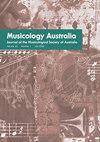The Rise and Fall, and the Rise (Again) of Feminist Research in Music: ‘What Goes Around Comes Around’
IF 0.3
0 MUSIC
引用次数: 10
Abstract
This article reports from a two-phase study that involved an analysis of the extant literature followed by a three-part survey answered by seventy-one women composers. Through these theoretical and empirical data, the authors explore the relationship between gender and music’s symbolic and cultural capital. Bourdieu’s theory of the habitus is employed to understand the gendered experiences of the female composers who participated in the survey. The article suggests that these female composers have different investments in gender but that, overall, they reinforce the male habitus given that the female habitus occupies a subordinate position in relation to that of the male. The findings of the study also suggest a connection between contemporary feminism and the attitudes towards gender held by the participants. The article concludes that female composers classify themselves, and others, according to gendered norms and that these perpetuate the social order in music in which the male norm dominates.女性主义音乐研究的兴衰与兴起:“来龙去脉”
本文的研究分为两个阶段,包括对现存文献的分析,然后是对71位女作曲家的三部分调查。通过这些理论和实证数据,作者探讨了性别与音乐的象征资本和文化资本之间的关系。运用布迪厄的习惯理论来理解参与调查的女性作曲家的性别体验。文章认为,这些女性作曲家在性别方面有不同的投入,但总的来说,鉴于女性习惯相对于男性习惯处于从属地位,她们加强了男性习惯。研究结果还表明,当代女权主义与参与者对性别的态度之间存在联系。文章的结论是,女性作曲家根据性别规范对自己和他人进行分类,这些规范使男性规范占主导地位的音乐社会秩序得以延续。
本文章由计算机程序翻译,如有差异,请以英文原文为准。
求助全文
约1分钟内获得全文
求助全文

 求助内容:
求助内容: 应助结果提醒方式:
应助结果提醒方式:


